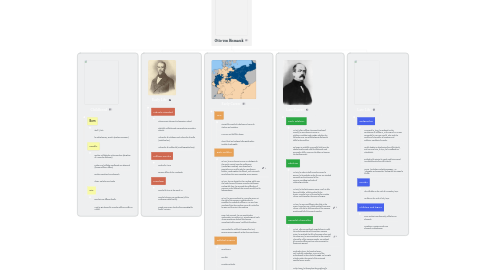
1. Childhood
1.1. Born
1.1.1. April 1, 1815
1.1.2. in Schönhausen, Prussia (modern Germany)
1.2. Family
1.2.1. Mother: Wilhelmine Luise Mencken (daughter of a Prussian diplomat)
1.2.2. Father: Karl Wilhelm Ferdinand von Bismarck (former military officer)
1.2.3. Brother: Bernhard von Bismarck
1.2.4. Sister: Malwine von Arnim
1.3. Etc.
1.3.1. Born into an affluent family.
1.3.2. Used to get dressed in Prussian military outfits as a child.
2. Early Life
2.1. Schools attended
2.1.1. Johann Ernst Plamann's elementary school.
2.1.2. Friedrich-Wilhelm and GrauesKloster secondary schools.
2.1.3. University of Göttingen and University of Berlin (studying law).
2.1.4. University of Greifswald (studying agriculture)
2.2. Military service
2.2.1. Service for 1 year
2.2.2. Became officer in the Landwehr
2.3. Marriage
2.3.1. Married in 1847 at the age of 32.
2.3.2. Married Johanna von Puttkamer (of the Puttkamer noble family).
2.3.3. Spend some years shortly after managing his family's estates.
3. Early Career
3.1. Law
3.1.1. Started his practical training as a lawyer in Aachen and Potsdam.
3.1.2. Law was not his life's dream.
3.1.3. Short-lived and resigned after getting into trouble chasing girls.
3.2. Early politics
3.2.1. In 1847, he was chosen to serve as a delegate in the newly created Prussian parliament (Vereinigter Landtag). Here he gained a reputation as a royalist who in a reactionary fashion, spoke against the liberal, anti-autocratic Revolutions that were sweeping across Europe.
3.2.2. In 1849, he was elected to the Landtag, which was the lower house of the new Prussian parliament. During this time, he opposed the unification of Germany as he believed that Prussia would lose its independence.
3.2.3. In 1851, he was appointed as a Prussian envoy at the Diet of the German Confederation in Frankfurt by Frederick William IV. He was later appointed into the Prussian House of Lords after he gave up his seat at the Landtag.
3.2.4. From 1851 onwards, he was appointed as ambassador to Prussia at St. Petersburg and Paris. These experiences helped him become acquainted with Europe’s political situations.
3.2.5. Was marked by political changes after 1851; Became more pragmatic rather than reactionary.
3.3. Political stances
3.3.1. Reactionary
3.3.2. Royalist
3.3.3. Prussian unionist
3.3.4. Conservative
4. Late Career
4.1. Early Ministry
4.1.1. In 1861, after William I became the King of Prussia, he was chosen to serve as Minister-President and Foreign Minister the following year. He exhibited great diplomatic skills in the position.
4.1.2. He began to establish a powerful hold over the administration and with his diplomatic and persuasive skills, won over the king. He became the leading power.
4.2. Minister
4.2.1. In 1864, in order to built Prussian power in Europe, he launched a series of wars. He attacked Denmark and took control of the German-speaking territories of Schleswig-Holstein.
4.2.2. In 1866, he incited Emperor Franz-Josef I to join forces with him, which resulted in the Austro-Prussian War. This resulted in Prussian victory and thereafter the Peace of Prague.
4.2.3. In 1870, he was unwilling to take risks at the Franco-Prussian War, which resulted in German victory. This led to the formation of the German Empire and fall of the French Empire.
4.3. Imperial Chancellor
4.3.1. In 1871, after succeeding in negotiations to unify the Prussian Empire with Southern German states, he received the title of German prince and the same year, he was appointed as the Imperial Chancellor of the German Empire. He retained his Prussian offices and was also promoted as lieutenant-general.
4.3.2. During the 1870s, he launched many anti-Catholic campaigns, as a part of the Kulturkampf or the cultural struggle. He brought schools under the control of the state and expelled many Jesuits.
4.3.3. In the 1880s, he focused on the creation of a modern welfare state that provided its citizens with national healthcare services, accident insurance and pension schemes for the old.
5. Late Life
5.1. Resignation
5.1.1. On March 18, 1890, he resigned on the persistence of William II, at the age of 75. He was succeeded by Leo von Caprivi, who took the position of Chancellor of Germany and Minister-President of Prussia.
5.1.2. Health begins to deteriorate after wife's death, and one year later, in 1895, he is confined to a wheelchair.
5.1.3. Retired to his estates in Varzin and later moved to Friedrichsruh after wife's death.
5.1.4. Wrote ‘Gedanken und Erinnerungen-- or ‘Thoughts and Memories’ during this late stage in his life.
5.2. Deaths
5.2.1. His wife dies on the 27th of November, 1894.
5.2.2. He dies on the 30th of July, 1898.
5.3. Children and legacy
5.3.1. Sons: Herbert von Bismarck, Wilhelm von Bismarck
5.3.2. Daughter: Countess Marie von Bismarck-Schönhausen

